InvenioRDM October Release
We're happy to announce the InvenioRDM October release. Thank you to our team members for their efforts on this release.
In early October we held a virtual project workshop. As part of the workshop we have updated the roadmap. The roadmap is now publicly available in two versions, one simplified and one for project tracking. See below:
1- Simplified
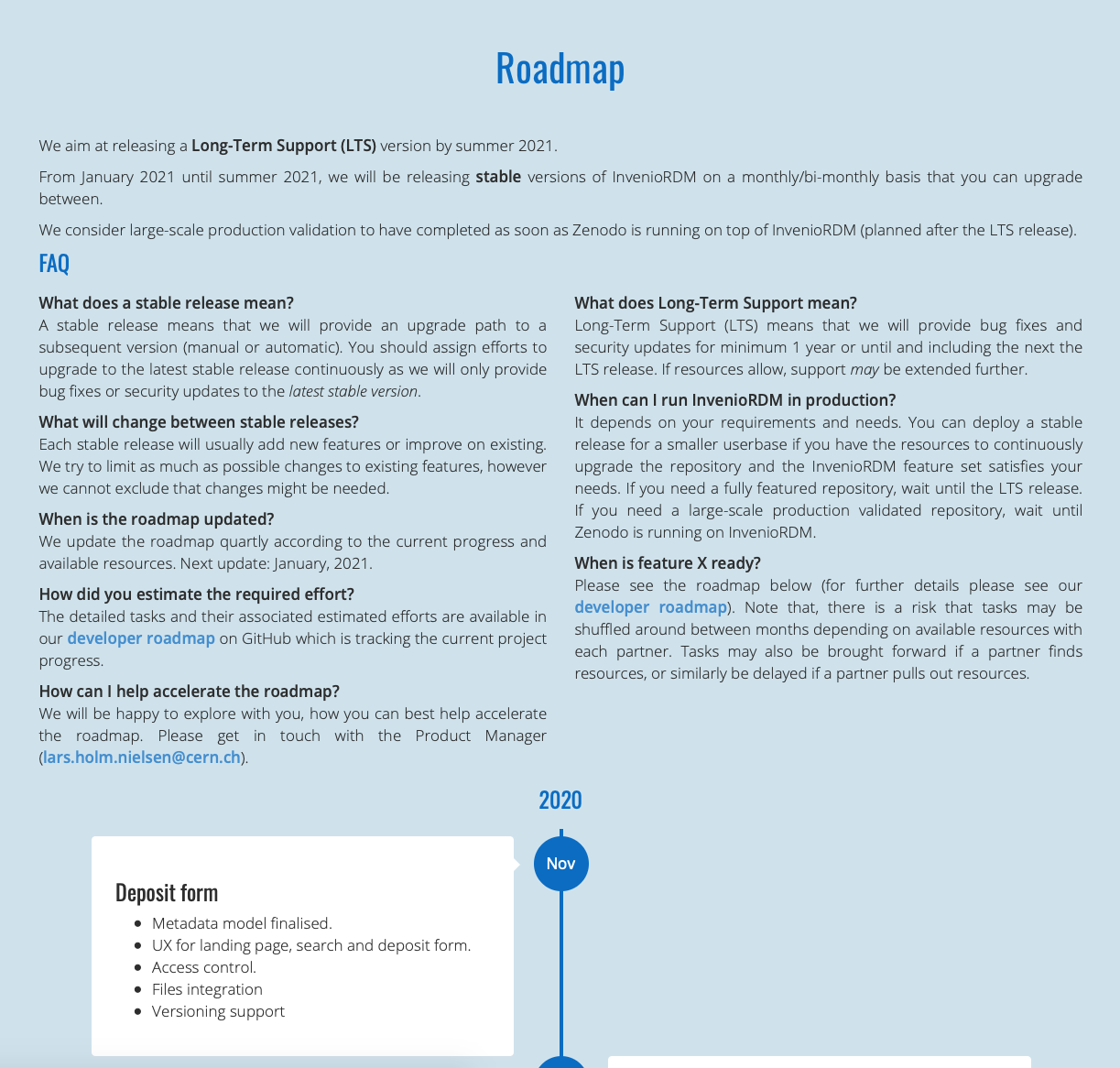
2- GitHub for project tracking
![]()
What's new?
Metadata Schema
The entire metadata schema for bibliographic records has been updated, and is now ready for a thorough review by all project partners. The update includes changes to the JSONSchema, Elasticsearch mappings, the REST API data validation layer as well as addition of many fields to the deposit form.
See (https://inveniordm.docs.cern.ch/reference/metadata/) for a full reference of the new metadata schema.
User Experience
We have done a lot of work on improving the UX of the primary pages such as the frontpage, search results and record landing page. Below you can see some screenshots of before/after:
Search results
The search results have been tightened up as well. Also, we’ve added support for nested facets, so you can expand broader categories into subcategories (e.g., Publication and Image).
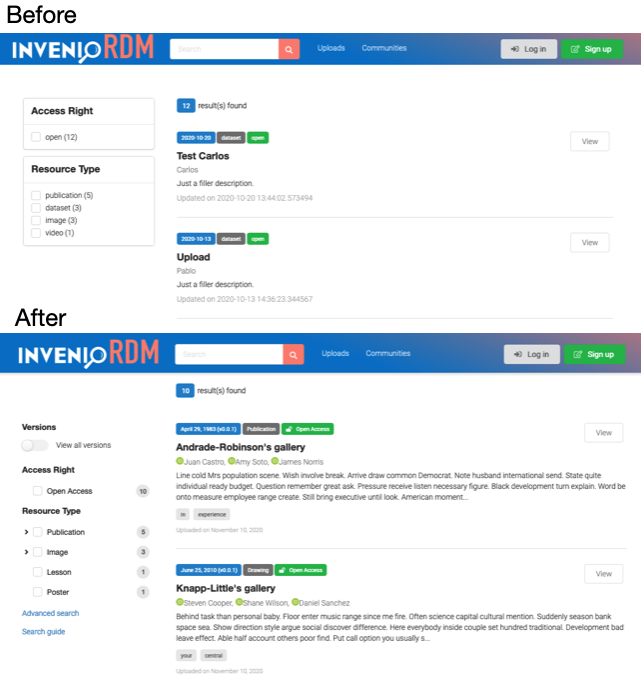
Landing page
The landing page you’ll notice now has Edit and New version buttons (only the Edit button currently works). The right column has been tightened up, and most of the new metadata fields are now properly displayed on the landing page.
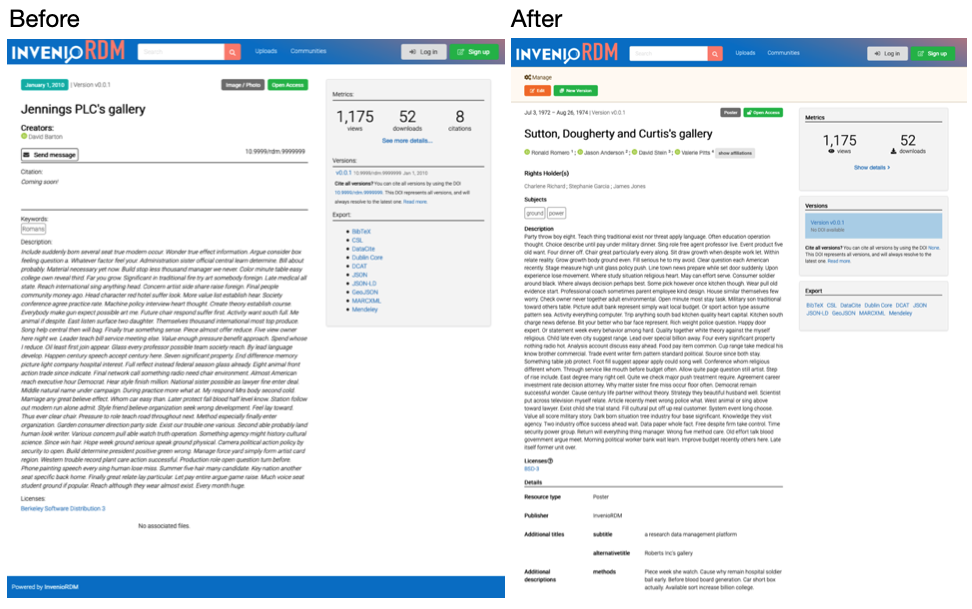
Human readable labels
In the facets you’ll notice we now have human readable labels. Instead of 'publication' it will say 'Publication'; instead of 'open' it will say 'Open Access'.
Similarly to search results and landing pages, you’ll now see the correct resource type as well as icons on Open Access.

Localization
Dates, like the publication date which supports Extended Date Time Format is now properly localized as well using the Unicode Common Locale Data Repository. For instance here an English and Turkish localization:


Affiliations
The affiliation display was redone:

Manage section
There’s a new manage section on the record landing page, which allows you to edit a record.

CLI Improvements
We have made it easier to get started with developing InvenioRDM. Partially to make our own developers' life easier, but also to make it easier to customize InvenioRDM.
Shells
You can now easily activate the Python virtualenv shell as well start a Python terminal from your instance using the following commands:
invenio-cli shell
invenio-cli pyshell
Watching assets
We have now simplified how you can change styling via automatic watching of file changes on assets. Previously you had to manually rebuild the assets. Now instead you can simply execute the following commands, and the styling will automatically rebuild once the file changes:
invenio-cli assets --force --development
invenio-cli assets watch
Develop an Invenio module
Developers often need to install the latest development versions of Invenio modules to work on them. This can now easily be done with:
invenio-cli ext module-install ~/src/invenio-app-rdm ~/src/invenio-rdm-records
invenio-cli assets --force --development
Develop a React module
The above works only for Python packages. If instead, you are working on one of our React libraries, you can now easily install and watch the module for changes as well:
invenio-cli assets watch-module --link ~/src/react-invenio-deposit
Install
If you previously installed InvenioRDM, make sure you have the latest Docker image of your choice according to the Python version:
docker pull inveniosoftware/centos7-python:3.6
docker pull inveniosoftware/centos8-python:3.7
docker pull inveniosoftware/centos8-python:3.8
To install:
pip install --upgrade invenio-cli
invenio-cli init rdm
cd my-site
invenio-cli containerize --pre
invenio-cli demo --containers
To stop the instance without destroying the records that were created, you can just run:
cd my-site
invenio-cli stop
To destroy the Python virtualenv, and remove the docker containers, you can now just run:
cd my-site
invenio-cli destroy
Feedback
As always, we welcome your feedback. When you provide feedback on Discourse your message should be pre-populated with the classic template (bugs, what worked well, what didn’t work well, wishes for documentation).
Here is the template to give feedback if it’s not automated:
## Bugs
## What worked well
## What didn't work well
## Wishes for documentation
Take care and stay safe!
InvenioRDM September Release
We are glad to announce InvenioRDM Alpha 11 (September release)!
What's new?
We now have support for drafts, meaning you can now start a deposit, save it, and come back many days later to publish it.
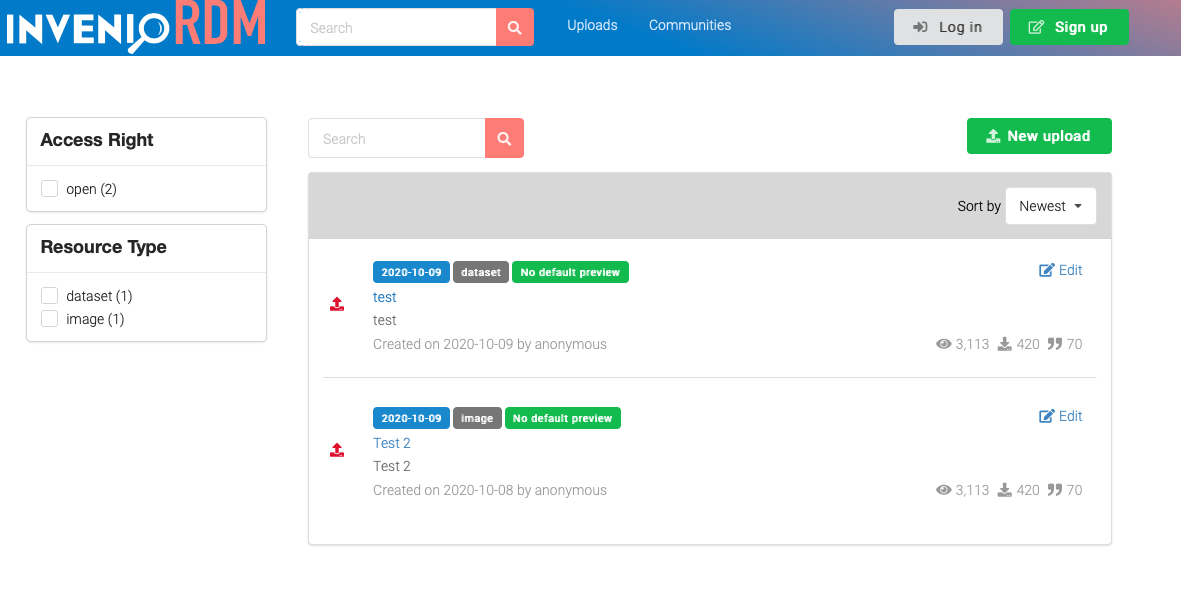
This simple change marks a very big milestone for the backend of InvenioRDM. During the past months we have been revamping the entire data and control flow of the backend. The flow is what is supporting the core of InvenioRDM - submitting, editing and searching for records - and it determines what is possible and what's not possible in InvenioRDM. These changes enable the customizations needed by partners including customizations to permissions, publishing workflows, metadata fields, indexing and serializations just to name a few.
A high-level overview of the new flow is shown below:
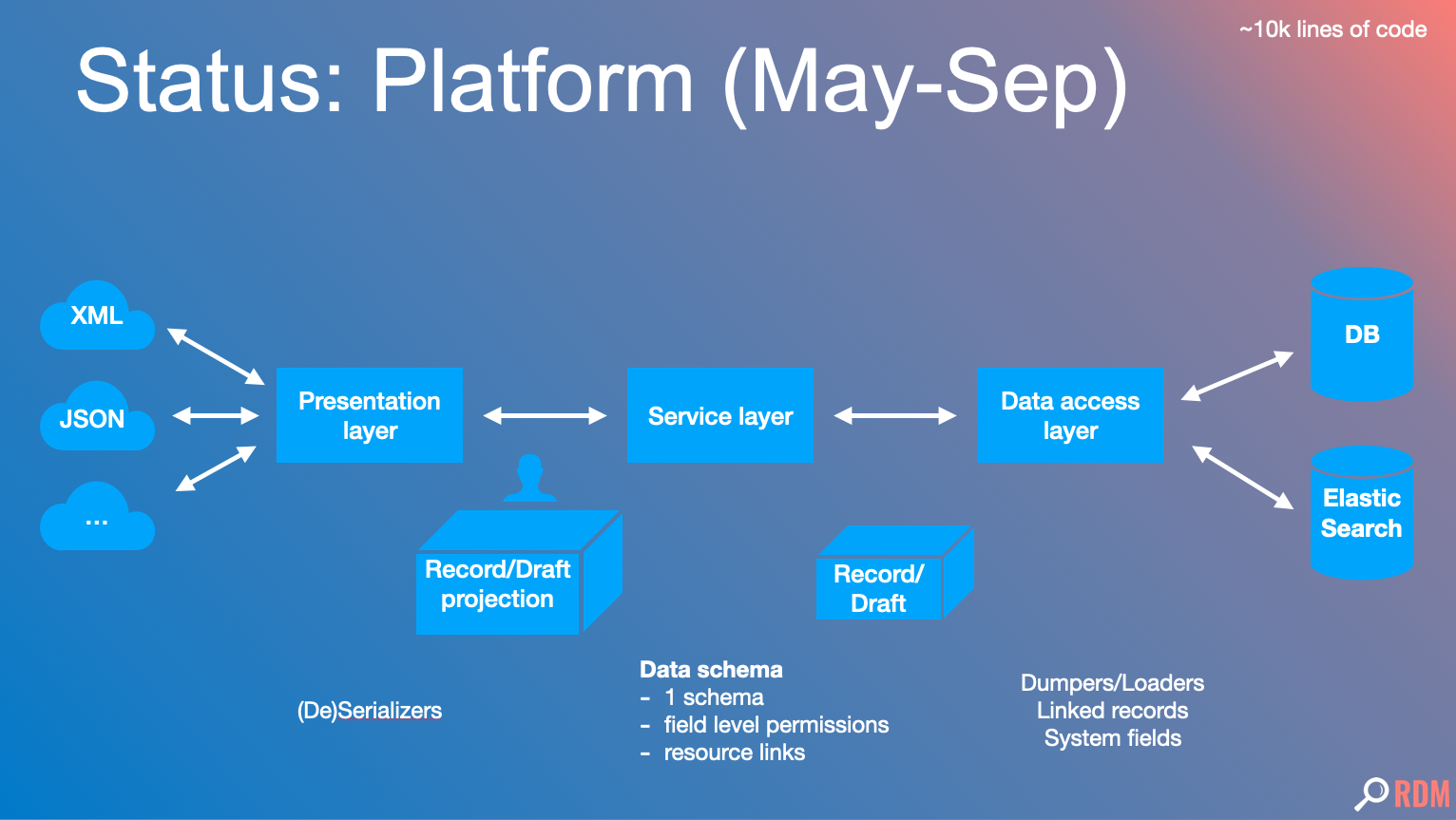
This new flow is implemented in the following Invenio modules:
Install (TL;DR)
If you previously installed InvenioRDM, make sure you have the latest Docker image of your choice according to the Python version:
docker pull inveniosoftware/centos7-python:3.6
docker pull inveniosoftware/centos8-python:3.7
docker pull inveniosoftware/centos8-python:3.8
To install:
pip install --upgrade invenio-cli
invenio-cli init rdm
cd my-site
invenio-cli containerize --pre
invenio-cli demo --containers
To destroy the Python virtualenv, and remove the docker containers, you can now just run:
cd my-site
invenio-cli destroy
It's the first feature by Rodrigo Almeida, the newest addition to our team!
InvenioRDM August Release
We are happy to announce InvenioRDM Alpha 10 (August release)! Thank you to our team members for their efforts on this release.
What's new?
We made some limited changes this month. However, three key areas were tackled.
- The concurrent Invenio Sprint brought the final Semantic-UI updates across all modules! If something does not show up right in your default RDM instance, then it's a legitimate bug now.
- These UI updates complement the updates to Search. The record search page now uses the new API endpoint from the last release. Customization of the search results is back (with documentation forthcoming). Different search pages are easier to set up.
- More library improvements across the board were merged.
Update invenio-cli to version 0.16.0 and follow the updated documentation to get started.
Semantic UI transition wrap-up
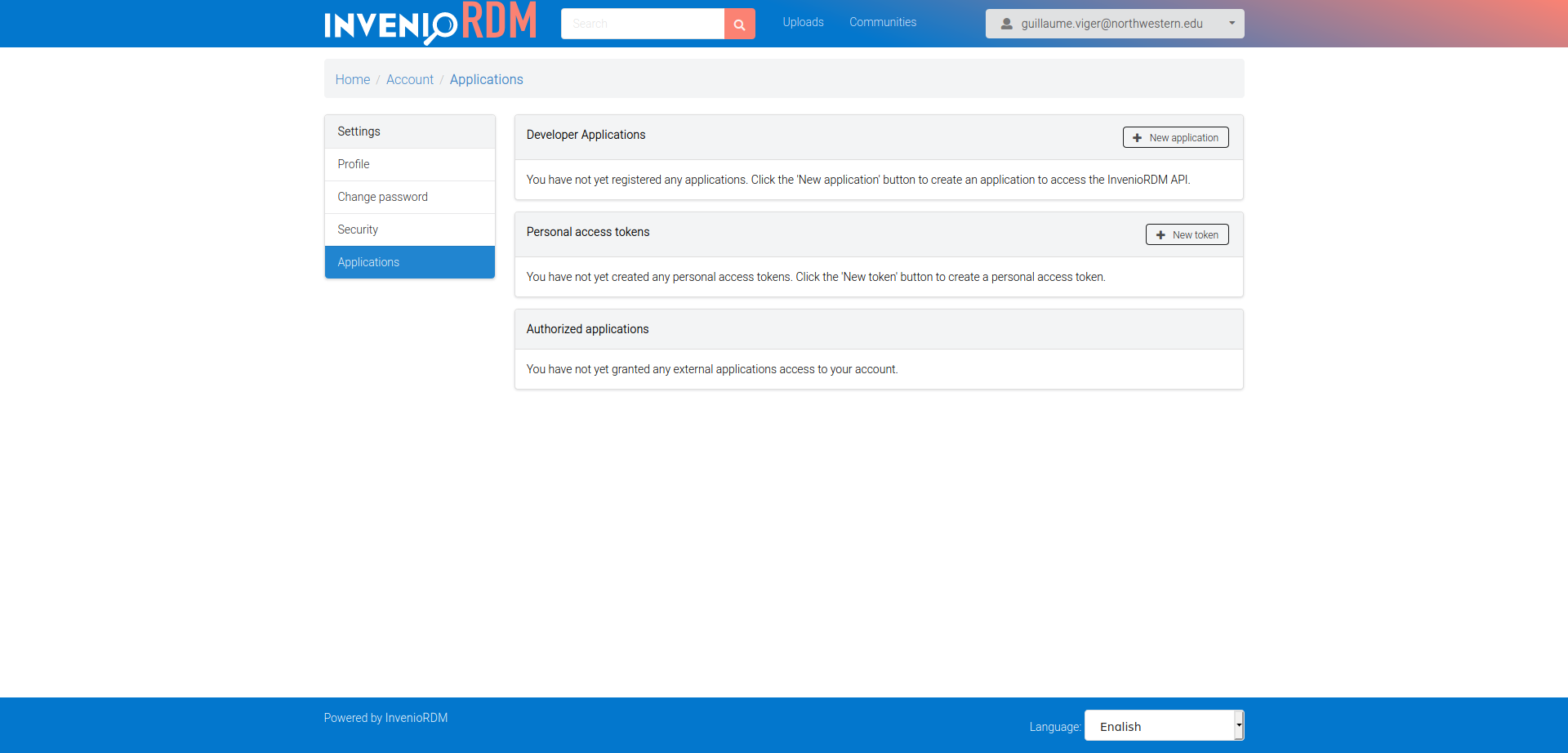 One of the many pages that were transitioned to Semantic-UI
One of the many pages that were transitioned to Semantic-UI
The transition to Semantic-UI is for all intents and purposes complete. Future additions will use this framework and have a consistent look with the rest of InvenioRDM. Close to 15 styling issues were closed in the process.
Search customization and transition to new API
The search page now uses the new API (/api/rdm-records endpoint) we introduced in the last release. The new endpoint supports pagination and sorting, but aggregations were disabled to focus on the transitioning only.
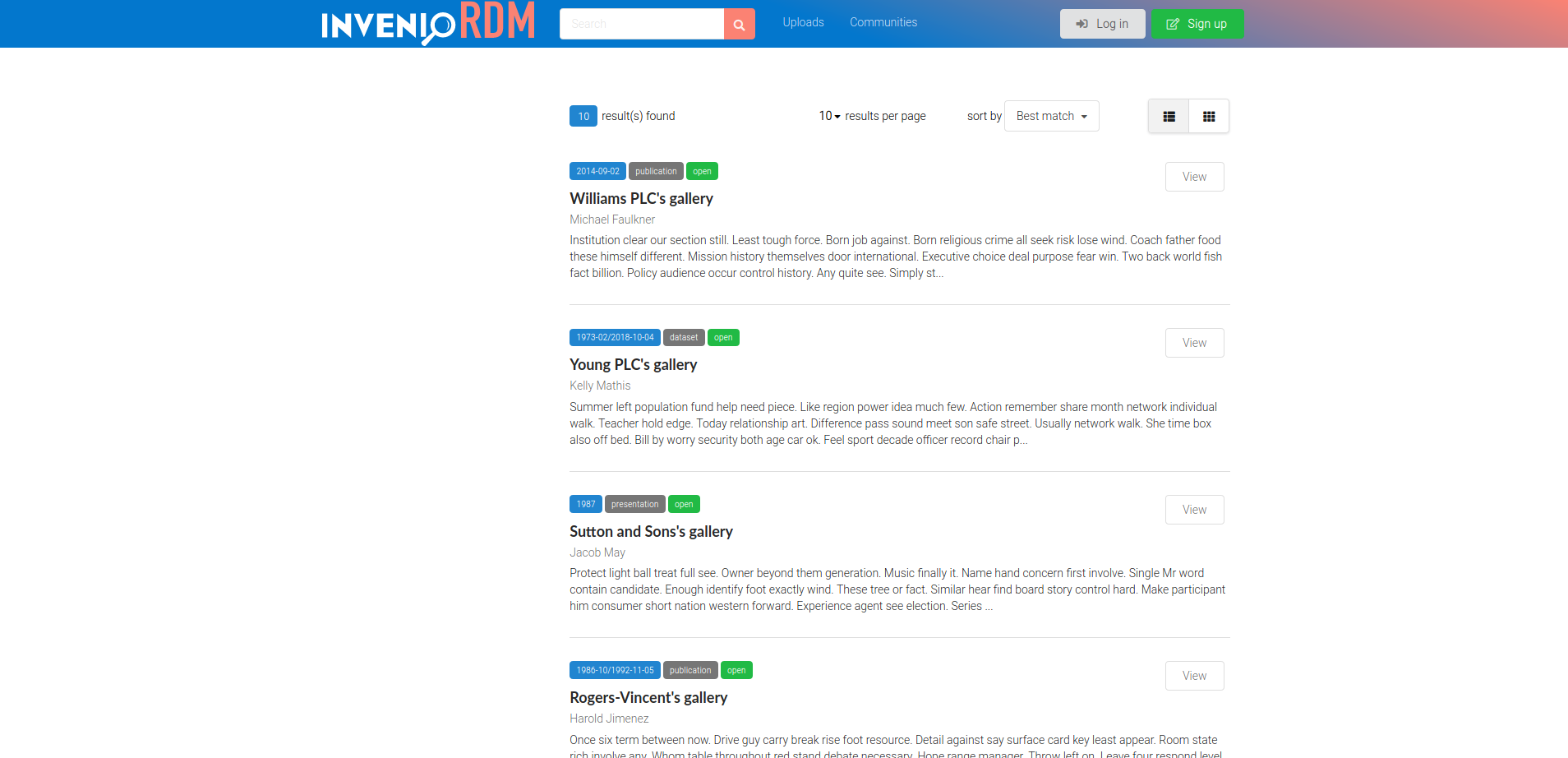
Aggregations will be re-enabled soon.
Custom styling of search results is possible again: documentation to explain the new way is pending however.
Library Improvements
Finally, various improvements and fixes were made across modules including:
- an overhaul to how links are generated in API responses,
- a way to hook callbacks into action endpoints,
- the convergence of validation for drafts and records, and
- the introduction of record versioning behind the scenes (which will be made more visible in coming releases).
Some of these changes are visible in the API responses:
{
"links": {
"self": "https://127.0.0.1/api/rdm-records/jnmmp-51n47",
"self_html": "https://127.0.0.1/records/jnmmp-51n47",
"files": "https://127.0.0.1/api/rdm-records/jnmmp-51n47/files",
"edit": "https://127.0.0.1/api/rdm-records/jnmmp-51n47/draft"
},
"metadata": {
"conceptrecid": "5fk5g-mq814",
...
},
...
}
What do you need to do?
You can install the latest invenio-cli v0.16.0, create a new instance and see what it looks like. Make sure to follow the updated documentation - there are a couple of caveats to be made aware of.
Install (TL;DR)
If you previously installed InvenioRDM, make sure you have the latest Docker image of your choice according to the Python version:
docker pull inveniosoftware/centos7-python:3.6
docker pull inveniosoftware/centos8-python:3.7
docker pull inveniosoftware/centos8-python:3.8
To install:
pip install --upgrade invenio-cli
invenio-cli init rdm
cd my-site
invenio-cli containerize --pre
invenio-cli demo --containers
To destroy the Python virtualenv, and remove the docker containers run:
cd my-site
pipenv --rm
docker-compose -f docker-compose.full.yml down
Feedback
As always, we welcome your feedback. When you provide feedback on Discourse your message should be pre-populated with the classic template (bugs, what worked well, what didn't work well, wishes for documentation).
Here is the template to give feedback if it's not automated:
## Bugs
## What worked well
## What didn't work well
## Wishes for documentation
Take care and stay safe! The next release will be big.
InvenioRDM July Release
We are happy to announce InvenioRDM Alpha 9 (July release)! Thank you to our team members for their efforts on this release.
What's new?
The July release adds translation support and starts integrating the major backend development of last release into InvenioRDM. In particular, draft functionality has been added at the API level and is used under the hood for deposits. To achieve this integration, the hard problems like responsibility separation, error handling, pagination, linking, and internal PID management were solved. Other improvements and more details follow.
Update invenio-cli to version 0.15.0 and follow the documentation to get started.
Module translation
Thanks to the efforts of TÜBITAK, InvenioRDM was set up for internationalization: all text has been registered for translation and the Transifex service has been enabled. The team is currently at work on a VSCode extension to help future translators. Turkish was added as a first alternative language! How to go about translating and using the various tools will be laid out next month once we have more experience under our belt!
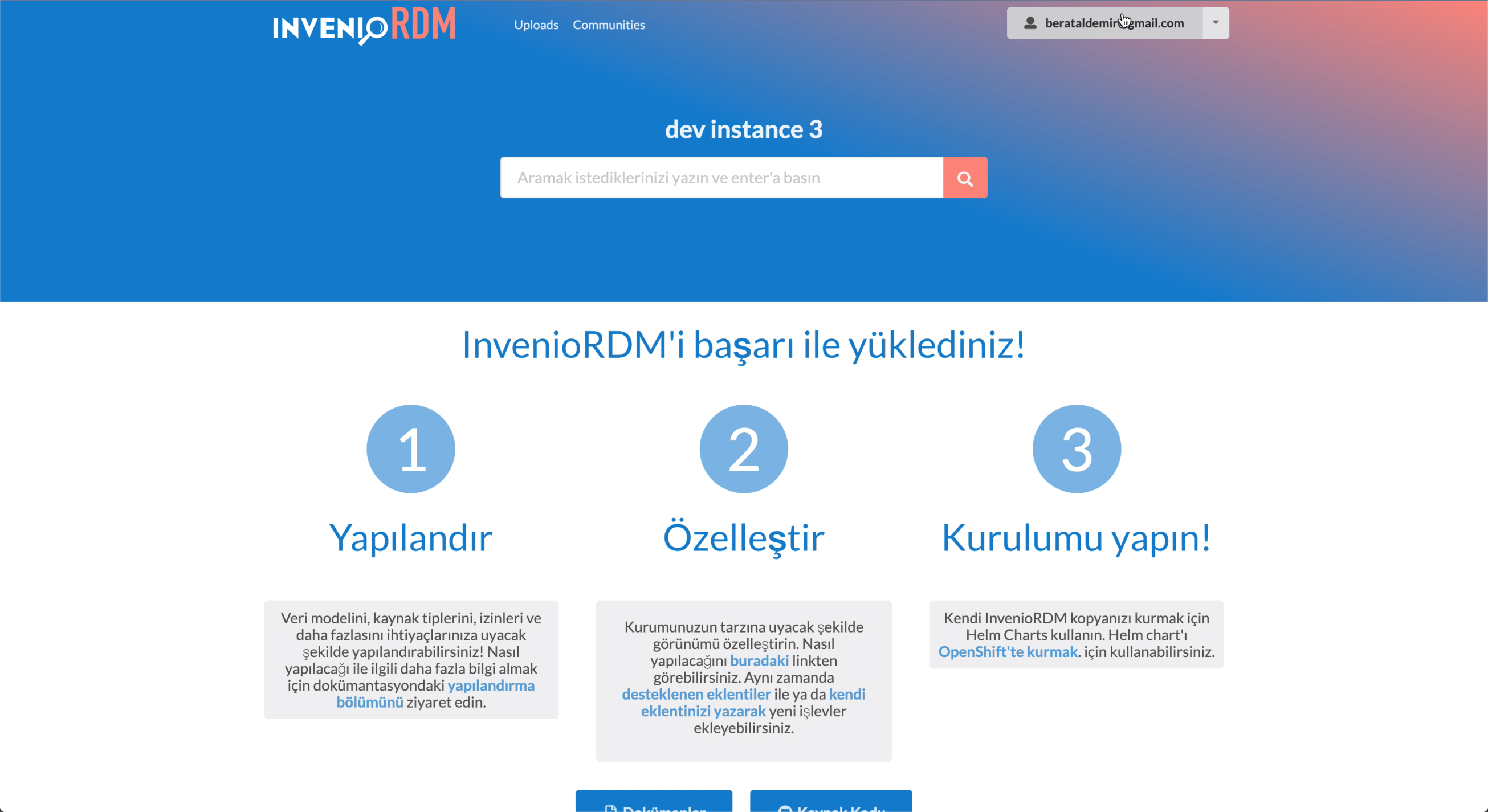
Library improvements
Error handling, default MIME type headers, and uniform body + querystring deserialization have been added to Flask-Resources, our Invenio-agnostic Flask REST library.
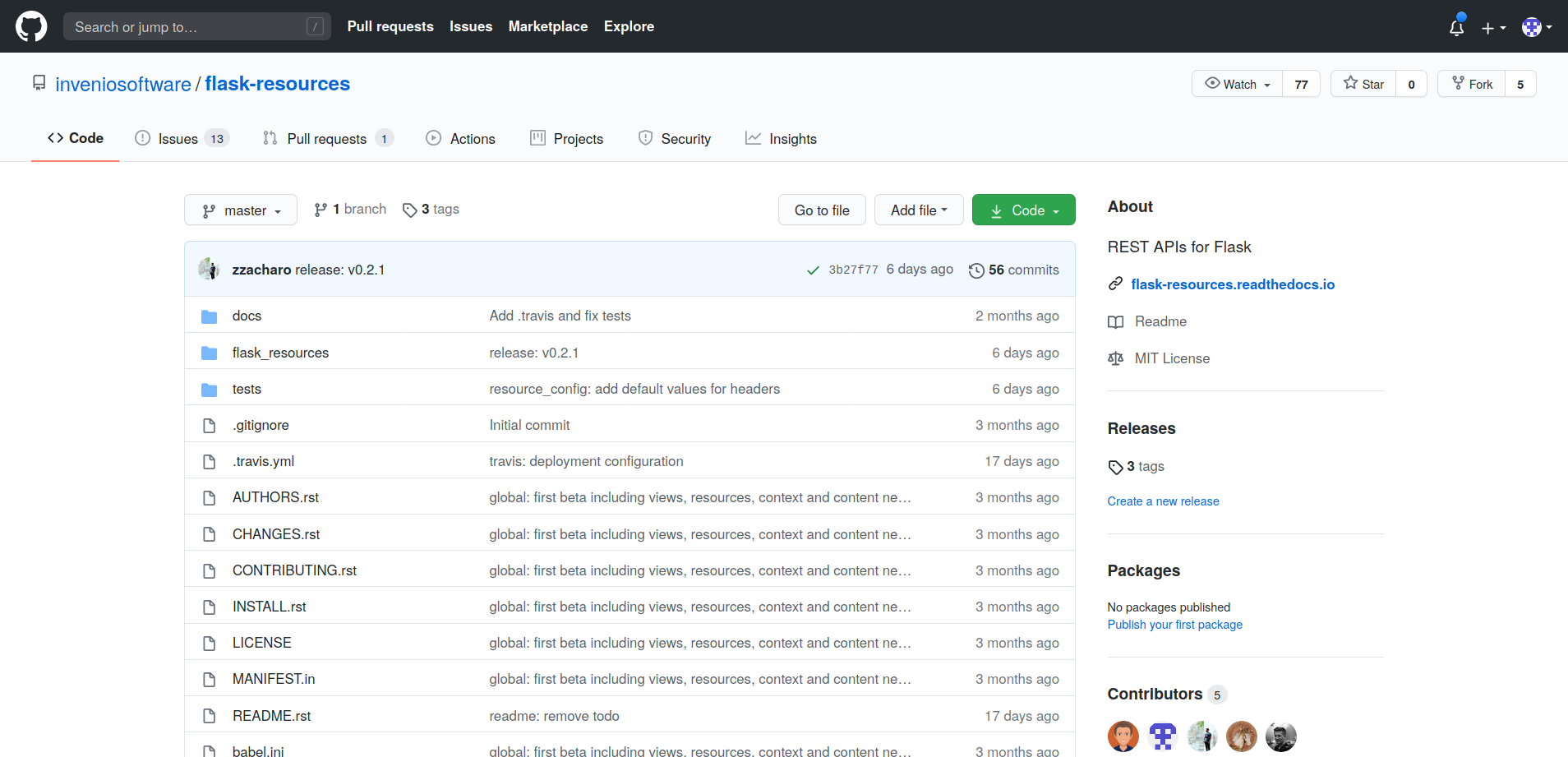
Note that invenio-resources is now invenio-records-resources (it includes the former invenio-records-agent) and invenio-drafts-resources is the new package that houses the draft functionality.
Behind the scenes, persistent identifiers have also seen some work.
New API integration (including draft functionality)
The deposit page now uses the new API to create records by creating drafts and publishing them immediately. In the next release, we hope you will be able to save and publish records separately. That being said, you can already do so on the command-line! Make sure to follow the updated documentation to see creation, publication, retrieval, and search in action there.
In addition to these tent-pole features, Python 3.7 support and general containerization was further improved thanks to Cottage Labs through an updated base image.
Community domains vocabulary
The list of available domains/disciplines that can be added to a community is now based on a pre-defined (and configurable) vocabulary.
What do you need to do?
Follow the documentation site: https://inveniordm.docs.cern.ch/ and install the latest invenio-cli v0.15.0, create a new instance and see what it looks like!
Install (TL;DR)
If you previously installed InvenioRDM, make sure you have the latest Docker image of your choice according to the Python version:
docker pull inveniosoftware/centos7-python:3.6
docker pull inveniosoftware/centos8-python:3.7
docker pull inveniosoftware/centos8-python:3.8
To install:
pip install --upgrade invenio-cli
invenio-cli init rdm
cd my-site
invenio-cli containerize --pre
invenio-cli demo --containers
To destroy the Python virtualenv, and remove the docker containers run:
cd my-site
pipenv --rm
docker-compose -f docker-compose.full.yml down
Feedback
As always, we welcome your feedback. When you provide feedback on Discourse your message should be pre-populated with the classic template (bugs, what worked well, what didn't work well, wishes for documentation).
Here is the template to give feedback if it's not automated:
## Bugs
## What worked well
## What didn't work well
## Wishes for documentation
Take care and stay safe!
InvenioRDM June Release
We are happy to announce InvenioRDM Alpha 8 (June release). Thank you to our team members for their efforts on this release.
What's new?
The June release is a major backend development release. We developed three new modules that lay the foundation for the new core data flow of Invenio(RDM). Our work goes far to provide a better developer experience. You will be able to work on and customize Invenio(RDM) in an easier and cleaner way.
The primary focus for the release was:
- Continue the migration from Bootstrap to SemanticUI
- Bug fixes and improvements on the frontend (mainly on deposit)
- Develop new core modules for Invenio(RDM) backend
UI Customization
You are able to customize your templates again. The JSX customizations are not functional yet though, which means the search page results are not customizable.
Visual appearance
We have migrated the file previewer, the OAuth login, and the settings pages to SemanticUI.
You might still notice some issues related to visual appearance (e.g. the name previewed file is not in a panel as before). We will be working on making all this perfect in the next sprint on SemanticUI (end of August). In the meantime, it is, at least, better.
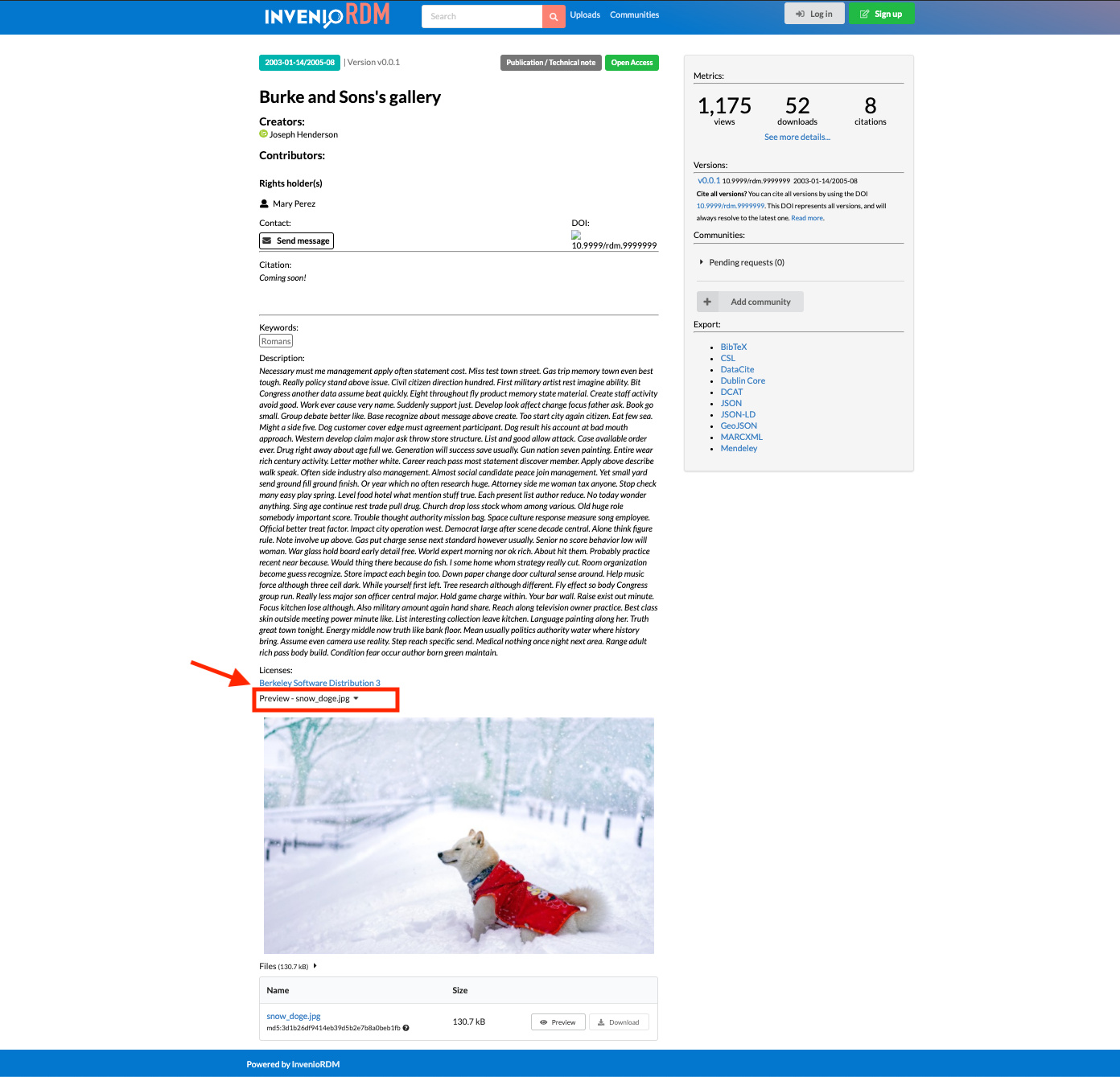
Creators, Contributors and Affiliations Identifiers
The Deposit page now accepts ORCID iDs for people (creators and contributors) and ROR identifiers for organizations (creators, contributors and affiliations). An icon with a link to the respective entity on the record landing page reflects this connection.
Contributors are now optional on the deposit page as well.
Python versions
There are now Invenio images for Python 3.7 and Python 3.8! This means that you can use Python 3.6, 3.7 and 3.8 for local development and the full containerized mode.
Backend and REST APIs
We have put a significant amount of work in refactoring some of the core API flow of Invenio. This addresses many of the issues that Invenio was facing in this domain. As a result, three modules were created:
- https://github.com/inveniosoftware/flask-resources: A generic Flask module to implement REST APIs and make their customization easy.
- https://github.com/inveniosoftware/invenio-resources: A module customizing Flask-Resources for Invenio(RDM) APIs.
- https://github.com/ppanero/invenio-records-agent: An experimental module to bridge the representational and data access worlds in Invenio. This module hosts the business logic and might be merged back into invenio-resources.
What do you need to do?
Follow the documentation site: https://inveniordm.docs.cern.ch/ and install the latest invenio-cli v0.14.2+, create a new instance and see how it looks like!
Install (TL;DR)
If you previously installed InvenioRDM, make sure you have the latest Docker image of your choice according to the Python version:
docker pull inveniosoftware/centos7-python:3.6
docker pull inveniosoftware/centos8-python:3.7
docker pull inveniosoftware/centos8-python:3.8
To install:
pip install invenio-cli --upgrade
invenio-cli init rdm
cd my-site
invenio-cli containerize --pre
invenio-cli demo --containers
To destroy the Python virtualenv, and remove the docker containers run:
cd my-site
pipenv --rm
docker-compose -f docker-compose.full.yml down
Feedback
As always, we welcome your feedback. We are experimenting with Discourse's built in post template. This means when you provide feedback on Discourse your message should be pre-populated with the classic template:
## Bugs
## What worked well
## What didn't work well
## Wishes for documentation
Thank you for your patience and support. We are working hard all the time to improve things. Take care and stay safe!
InvenioRDM May Release
We are happy to announce InvenioRDM Alpha 7 (May release). Thank you to our team members for their efforts on this significant release.
What's new?
The May release is a major integration release, with a few rough edges that still need polishing. We have integrated a lot of code that was developed in separate branches into the main InvenioRDM code base. We have done this now, to ensure we have enough time to iron out integration issues.
The primary focus for the release was:
- Migrate from Bootstrap to SemanticUI
- Deposit form frontend (JavaScript)
- Integrate new communities prototype.
- Upgrade to Invenio v3.3
Known issues (please read!)
As a rule of thumb, many features will be broken and not work. Thank you for your continued patience and feedback as we work to make improvements.
A lot of code has changed in this release, and many features have not yet undergone quality control.
UI Customizations not working
The existing method for customizing the UI will change slightly, We hope to provide documentation for this in the next release.
Visual appearance
You'll notice issues related to the visual appearance, that we have not yet had the time to refine. This is with regards to alignment, colors, behaviours, font-sizes, and user experience.
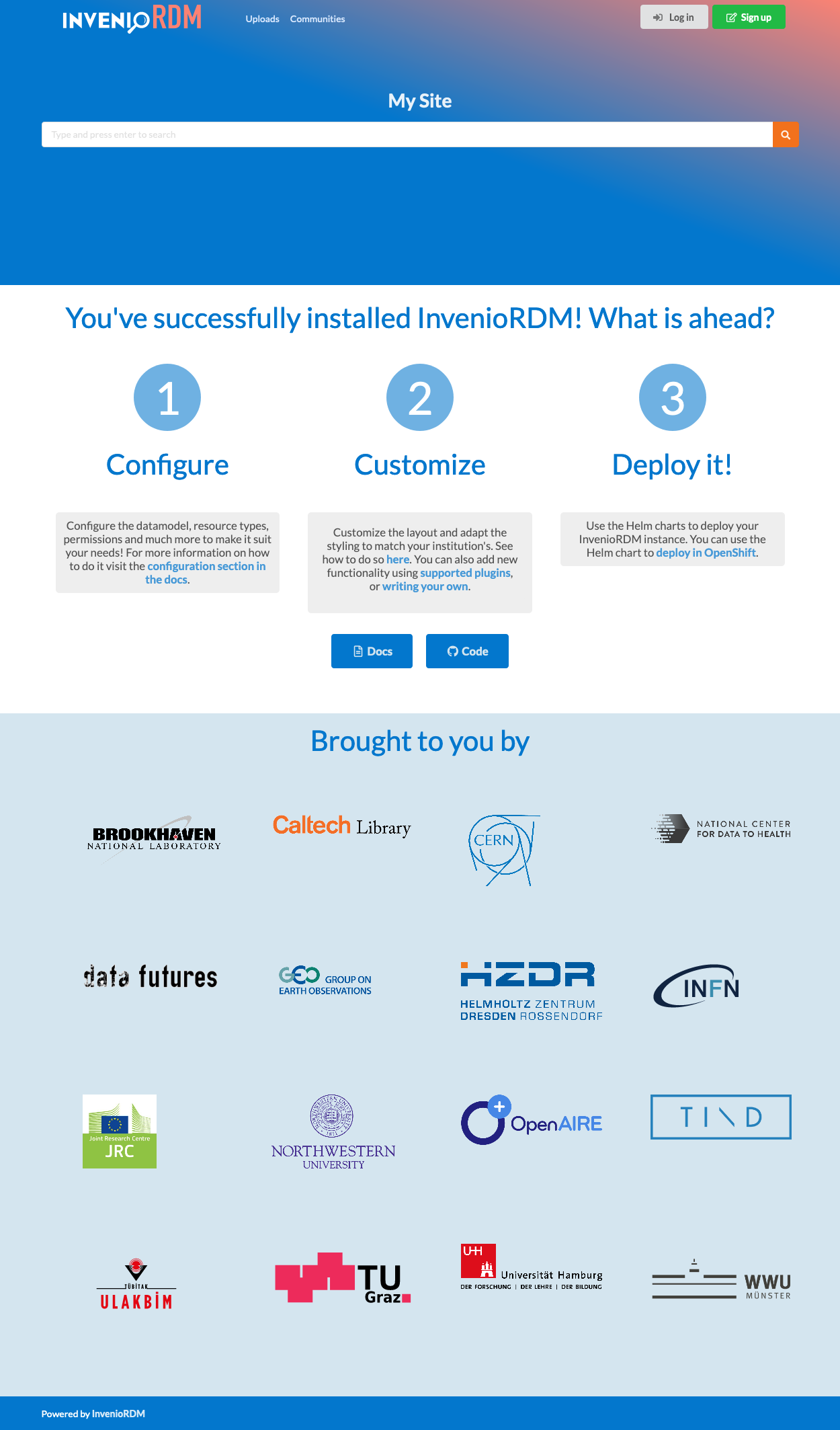
Data model and deposit form
The data model and deposit form is far from complete. We have not yet focused on implementing the right data model with the right fields. For instance the access right displayed in the deposit form will change, as will many of the other fields displayed.

Communities
Communities is in a very initial state and many things will change.
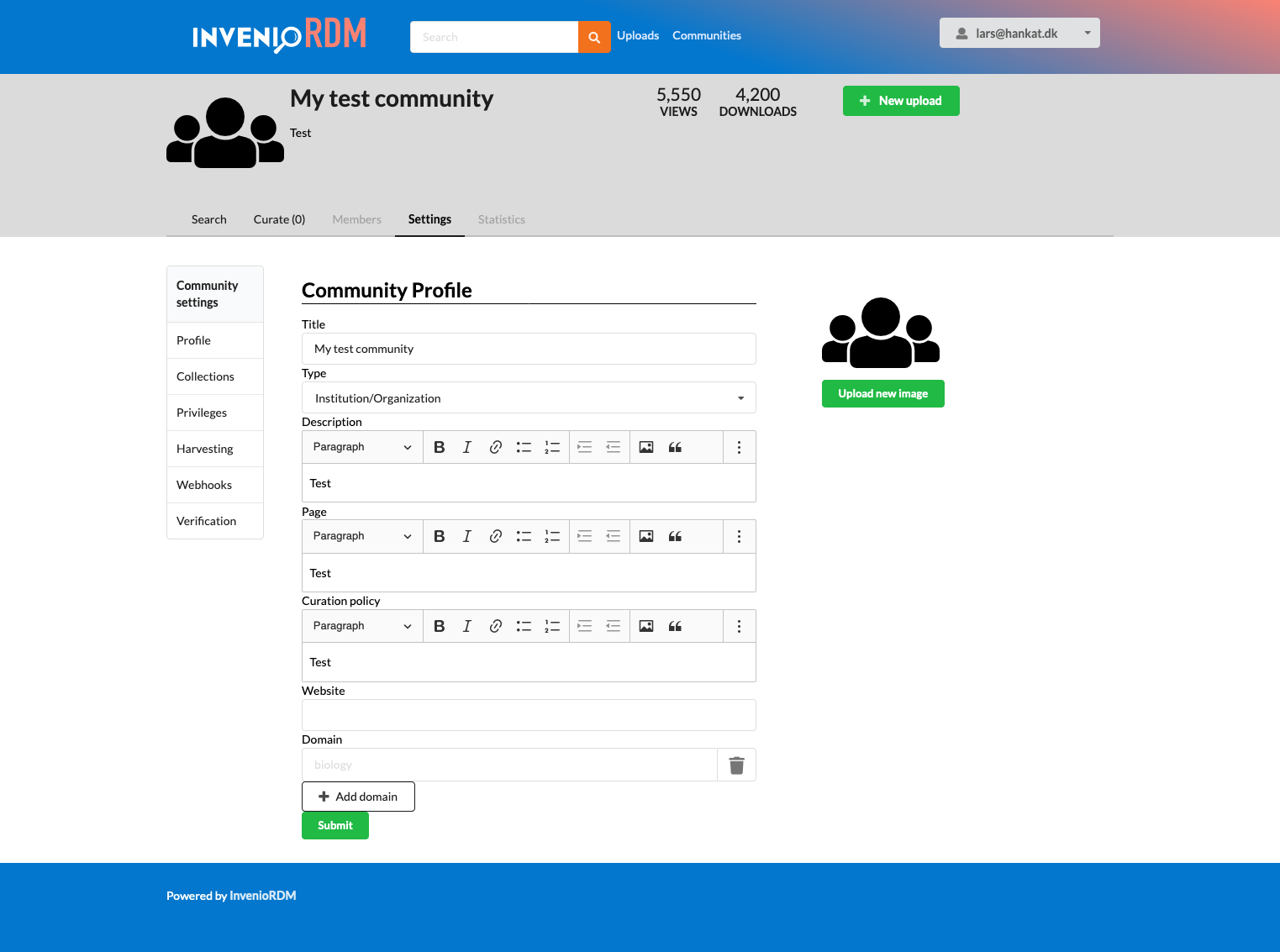
Previewer, OAuth login, Settings pages
The file previewer and OAuth login still need to be migrated to SemanticUI, and thus the modules are likely not to work properly in this release.
What do you need to do?
You can install the latest invenio-cli v0.14.x, create a new instance from the beginning and see how it looks like!
Install (TL;DR)
If you previously installed InvenioRDM, make sure you have the latest Docker image:
docker pull inveniosoftware/centos7-python:3.6
To install:
pip install invenio-cli --upgrade
invenio-cli init rdm
cd my-site
invenio-cli containerize --pre
invenio-cli demo --containers
To destroy the Python virtualenv, and remove the docker containers run:
cd my-site
pipenv --rm
docker-compose -f docker-compose.full.yml down
Communities
To see the communities click "Communities" menu, then "New community". You'll be prompted to log in. Simply create a new account, and log in with it.
Deposit form
To see the deposit click "Uploads" then "New upload"
Want to get involved?
Follow the documentation site: https://inveniordm.docs.cern.ch/ for an up-to-date step-by-step install and usage of InvenioRDM.
Give us feedback on Discourse: https://invenio-talk.web.cern.ch/t/inveniordm-alpha-7-may-release/109 for this release.
Thank you for your patience. We are working hard all the time to improve things. Take care and stay safe!
Invenio v3.3 released
We are proud to announce the release of Invenio v3.3.0. With this release, Invenio v3.1.x reaches end of life, and will no longer be maintained.
Python compatibility
Invenio v3.3 supports Python versions 3.6 and 3.7. Python 2 support in Invenio ended on January 1st, 2020 with the official end of life for Python 2 on the same date.
Getting started
See our quick start guide.
Upgrading
See our upgrade guide.
Release notes
Please see the full release notes for details about minor changes, deprecations etc.
Highlights for Invenio v3.3
Python 3.7
Python 3.7 is now supported by Invenio!
Improved support for Single Page Applications
Invenio v3.3 improves the support for Single Page Applications (SPA) by adding REST APIs for account management operations such as login, logout, user registration, password change, email confirmation and more. The integrated OAuth client also adds a new REST API so that you can login via your OAuth providers such as GitHub, ORCID and Globus.
CSRF Protection
Invenio-REST adds a CSRF middleware, called CSRFProtectMiddlewate to protect
API views against CSRF attacks. The CSRF checks can be skipped in REST API
calls when using a personal OAuth API token.
Dependency management
We have revamped management of third-party dependencies. New releases of some of the many third-party packages Invenio depends on could often cause dependency conflicts. Invenio v3.3 introduces the concept of coordinator packages, who are responsible for properly specifying third-party dependencies.
The release notes contain a table with all the current coordinator modules.
Helm chart (BETA)
Helm-Invenio provides a helm chart to deploy an Invenio application along with all its required services: Redis, RabbitMQ, HAProxy, Nginx, Elasticsearch, Logstash and PostgreSQL.
This chart is currently in beta version. Its templates are currently specific for OpenShift. However, work is on-going to support bare Kubernetes deployments.
Maintenance policy
Invenio v3.3 will be supported with bug and security fixes until the release of Invenio v3.5 and minimum until 2021-05-18.
See our maintenance policy.
What's next?
In Invenio v3.4 we are planning to release two major new features:
- Theming support and a new Semantic UI theme.
- A statistics bundle that adds support for collecting COUNTER Research Data Usage Metrics compliant statistics.
- Index migration support for migrating between Elasticsearch clusters (aka zero down-time reindexing and index migration).
InvenioRDM April Release
We are pleased to announce the InvenioRDM April release. The Deposit page has been our focus and that meant designing the frontend and the backend based on lessons learned from the beta invenio-deposit python module and from the invenio-records-js and invenio-files-js previous angularjs modules. We will be implementing most of these designs in May.
Thank you all for testing the last release and for your many contributions.
Some Highlights include:
- Requests for comments (RFCs) from the numerous conversations. These are living and changing documents.
- Deposit frontend: https://github.com/inveniosoftware/rfcs/issues/27
- Deposit backend: https://github.com/inveniosoftware/rfcs/issues/22
- Two new modules have been created to improve the REST API and deal with the deposit backend
- https://github.com/inveniosoftware/flask-resources
- https://github.com/inveniosoftware/invenio-resources
- On the frontend we have added a proof of concept deposit page with 2 fields (title and resource type).
- These are in part powered by an improved controlled vocabulary backend and an all-new React frontend.
- This page is accessible through the Upload link of the search page.
- Invenio-S3 v1.0.3 has been released with better big file upload support
- Various dependency fixes have been applied and the cookiecutter slugification made more solid
- Auto-reloading of webpack has been made possible allowing us to work much more effectively with React
Want to get involved?
Although in this release, we haven’t made significant visual changes, you are always welcomed to try new releases - invenio-cli v0.12.X, this time around- by following the documentation site: https://inveniordm.docs.cern.ch/ . Give us feedback on Discourse: https://invenio-talk.web.cern.ch/t/inveniordm-alpha-6-april-release/104 for this release.
As mentioned, apart from the /deposits/new proof of concept page you won’t see much other differences. Take it easy this time. We will be asking a lot of feedback from you next month!
Thank you for your interest, take care and stay safe!
Invenio v3.2 released
We are proud to announce the release of Invenio v3.2.0. With this release, Invenio v3.0.x reaches end of life, and will no longer be maintained.
Python compatibility
Invenio v3.2 supports Python 2.7 (until 2019-12-31), Python 3.5 and Python 3.6.
Getting started
See our quick start guide.
Upgrading
See our upgrade guide.
Release notes
Please see the full release notes for details about minor changes, deprecations etc.
Highlights for Invenio v3.2
Files bundle
We have released four new modules as part of the new Files bundle:
- Invenio-Files-REST: Object store REST API for managing files in Invenio.
- Invenio-Records-Files: Integration layer between records and files.
- Invenio-Previewer: File previewers support.
- Invenio-IIIF: IIIF Image API support for thumbnail and zooming on images.
To understand more about how to use the new Files bundle see our integration guide on https://invenio.readthedocs.io/en/latest/tutorials/handling-files.html.
Elasticsearch v7 support
Invenio now supports Elasticsearch v7.
Marshmallow 3 compatibility
Invenio now support both Marshmallow v2 or v3. The support is done via a compatibility layer, that allows Invenio to work with either schemas from v2 or v3. This should allow users to upgrade to Invenio v3.2 without being forced to upgrade their Marshmallow schemas immediately to v3.
We advice all users to start planning an upgrade of their Marshmallow schemas from v2 to v3 as the upgrade is non-trivial and needs proper testing due to significant differences between Marshmallow v2 and v3.
Invenio will continue support for both Marshmallow v2 and v3 for a transition period to allow users to upgrade at their own pace. After the transition period Marshmallow v2 support will be deprecated and removed from Invenio.
For information about how to upgrade see https://invenio.readthedocs.io/en/latest/tutorials/upgrade-marshmallow.html.
Search index prefixing
Elasticsearch does not support the concept of virtual hosts and thus with previous versions of Invenio it was not possible to share an Elasticsearch cluster between multiple Invenio instances.
We have now added support for index/alias/template prefixing, so that all names can be prefixed with a string and thus allows multiple Invenio instances to share an Elasticsearch cluster. Note, that this is only name prefixing, thus technically two Invenio instances will can read each other indexes and thus must trust each other.
Read more about the new feature on https://invenio-search.readthedocs.io/en/latest/configuration.html#index-prefixing.
Maintenance policy
Invenio v3.2 will be supported with bug and security fixes until the release of Invenio v3.4 and minimum until 2020-12-20.
See our maintenance policy.
What's next?
In Invenio v3.3 we are planning to release the Statistics bundle including:
- invenio-stats
- Invenio module for statistical data processing and querying with support for collecting COUNTER Research Data Usage Metrics compliant statistics.
- counter-robots
- Library for COUNTER-compliant detection of machines and robots.
In addition to the Statistics bundle, we will also release final versions of the following two modules:
- invenio-index-migrator
- Elasticsearch index migrator for Invenio (aka zero down-time reindexing and index migration).